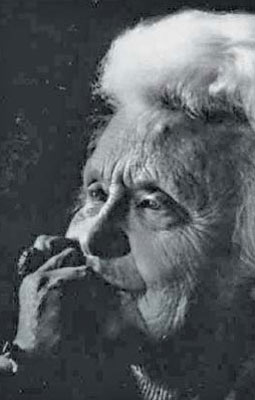Three years after she died in Beijing at the age of 97, Ruth Weiss (1908-2006), a Chinese Austrian who lived and worked in China for more than half a century, realized her last wish of resting by her good friend Madame Soong Ching Ling.
Family and friends shared memories about her unusual life at a special ceremony held in May for the unveiling of her memorial at the Soong Ching Ling International Cemetery in Shanghai.
"Ruth Weiss was a woman who truly loved China," recalls Scott Seligman, who was the Beijing representative of the US-China Business Council in the early 1980s. "She gave up a lot of opportunities to live a more comfortable life elsewhere in order to return to her adopted country and help build New China."
The elder son of Weiss, who declined to reveal his name, says that after his mother became a Chinese citizen in 1955, when children called her a foreigner, she'd proudly tell them that she was a Chinese, or a Shanghainese or Sichuanese.
Such puzzling terms reflect the deep relations that Weiss had with her second home.
|

|
|
Ruth Weiss lived and worked in China for more than half a century. [file photo from China Daily] |
Weiss first traveled to Shanghai in 1933. During her stay, she met Madame Soong (1893-1981), widow of Dr Sun Yat-sen (1870-1925), a revolutionary leader who played an instrumental role in overthrowing the Qing Dynasty in 1911 and founding the first republic in Chinese history.
She taught in the Jewish school in Shanghai and befriended Chinese writer Lu Xun (1881-1936). Weiss learned about China and identified with young Chinese students' revolutionary ideas. When she found out that her own Jewish parents had been killed by the Nazis in Germany around 1939, she decided to make China her home.
When Japan invaded China in 1936, Weiss went to Chengdu, Sichuan province, teaching English in universities, and editing an English newspaper, Chengdu Express.
But, says her elder son, Weiss never learned to enjoy spicy Sichuan food.
She also helped foreign journalists, such as Edgar Snow (1905-72) and Agnes Smedley (1892-1950), to report Chinese people's fight against Japanese invaders to the rest of the world.
When Rewi Alley (1897-1987) from New Zealand founded "Gung Ho" - an international committee for the promotion of Chinese industrial cooperatives, Weiss worked with him. In the 1980s when "Gung Ho" was revived, she again served as a member on the committee.
When the War of Resistance Against Japanese Aggression (1937-45) was over, Weiss returned to Shanghai, where she helped Madame Soong establish the China Welfare Institute aimed at protecting the welfare of women and children.
Weiss' husband, Yeh Hsuan, who was a mechanical engineer, won a scholarship to MIT and went to study in the United States, and Weiss joined him in 1946.
"My father did not want to return to China and stayed in the US. She tried to convince him to join her in China but to no avail, and they divorced in, I believe, 1954," says Weiss' elder son.
She returned to Beijing with her two sons in 1951 and became a German translator/editor at the Foreign Languages Press.
"She never remarried and brought me and my brother up single-handedly," says the son, who lived in China until a few years ago, when he moved to the US because his wife's health deteriorated. His younger brother now also lives in the US.
Isabel Crook, a Canadian teaching at the Beijing Foreign Studies University, first met Weiss in 1940 and recalls being impressed with the grand piano that took up almost half of her flat's small living room.
"Ruth was the only one of my friends who had a piano in those days, and it was a delight to hear her play," Crook says. Weiss learned piano at 4 and kept a lifelong passion for classical music.
"I cannot say what might have been the most difficult time for her except for when she fell very sick due to poor living conditions when she first returned to China and when she was mentally torn during the political movements when people were wrongly labeled and mistreated with no dignity," says her elder son.
However, she had the comfort of her friends. During the "cultural revolution" (1966-76), Madame Soong often quietly sent her private car to pick Weiss up for a chat at her place, recalls the son.
Weiss continued promoting China and building friendship bridges with European and North American countries through meetings with visitors to China, articles in the Hong Kong-based Da Gong Bao and Far Eastern Economic Review.
She also traveled twice to Hong Kong, Europe, Canada and America during the late 1970s and through the 1980s, giving lectures.
(China Daily June 1, 2009)